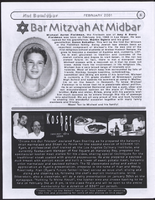Search the Special Collections and Archives Portal
Search Results

Transcript of interview with Jack W. Zunino by Stefani Evans and Claytee White, August 30, 2016
Date
Archival Collection
Description
Landscape architect Jack W. Zunino is a Fellow of the American Society of Landscape Architects (ASLA) and president of the Society's local chapter. He has designed many of Southern Nevada's iconic landscapes: the Rio Hotel, the M Resort, the Desert Demonstration Gardens, the gardens at Ethel M. Chocolates, the Cactus Avenue overpass, and most notably, the Springs Preserve. He's also a third-generation Nevadan from Elko, grandson of Italian immigrants who met and married in the Silver State and raised their large family in that Nevada mining town. The product of Elko schools, he graduated from the University of Utah in psychology and Utah State University in landscape architecture while earning his tuition as a road construction laborer. In this interview, Zunino tells of his employment with G.C. Wallace Engineering and JMA architects before founding his own landscape architecture firm in 1989. He speaks to the importance of planners and landscape architects on Southern Nevada's conser
Text

Transcript of interview with Elaina Blake by Stefani Evans and Claytee D. White, September 19, 2016
Date
Archival Collection
Description
Coming from humble beginnings, Elaina Blake grew up in Port Orchard, Washington, where her father was in the logging industry and she involved herself in the love of horseback riding. After becoming engaged at age 16, she married the following year at 17 and moved to Las Vegas where she started as a statistical typist at the Sahara Hotel and Casino. This led to a position her to become an executive secretary at the Thunderbird where she dealt with the rampant sexual harassment that was typical of the executive office environment in the industry at the time. The rejection of those advances led her to start her career in real estate with Roberts Realty where she sold her first group of homes off of Nellis Boulevard and Tropicana Avenue. In 1976, she made the entrepreneurial move by buying into Roberts Realty, becoming an owner, and eventually buying out Young American Homes. She started giving back to the community through her service as being the first woman elected to president elect for the Chamber of Commerce in 1984 and also served on the Clark County Planning Commission for four years serving as vice chairman and chairman. She did such a wonderful job running the chamber, she was approached to run for Lieutenant Governor. Her involvement with the community increased during this time as she got involved with the United Way, saved the YMCA from closure and started the Focus School Project in 1989 with former superintendent Brian Cram where businesses adopt schools and provide money and volunteer. This project is still in operation today and has given back $8 million dollars to CCSD in volunteerism. During her time with the Chamber, she continued to work with major local builders such as Pageantry Homes, Heers Brothers, and Christopher Homes, which led to her taking another entrepreneurial milestone by taking a small team to create Blake and Associates. In 1996, Blake leveled up to become a developer starting with office buildings. As a champion for the inclusion of women, she never felt held back because of her gender and she always encouraged women in the Chamber to give more of themselves, even if it was for ten minutes because the men did so. In a male-dominated industry, Elaina Blake has been a trailblazer for women in business and the housing industry in the valley.
Text

Transcript of interview with Bruce Woodbury by Claytee White, February 25, 2009
Date
Archival Collection
Description
When Bruce Woodbury, native Las Vegan, attorney, and former county commissioner, looks back on growing up, he immediately says: My first memory of a house here in Las Vegas was in the John S. Park area. The Woodbuiy family lived in two houses in the neighborhood and attended only two schools, John S. Park Elementaiy and Las Vegas High School. Bruce's recollections begin in the 1940s, when they lived on the edge of town. Bruce has what he calls a "nostalgic yearning for the old Las Vegas, even though today it's an exciting, vibrant community in many ways." And during this oral history interview, he recalls the safe feeling of the times—unlocked doors and children allowed to roam more freely than today. The Strip was a "separate world" where kids like himself might go to a show occasionally with their parents, celebrate a prom dance or, as he did, get a part-time job. One of Bruce's jobs included being a busboy at the Flamingo Hotel & Casino where he confesses to learning and
Text

Transcript of interview with Sally L. Jackson by Krista Jenkins, March 2, 1980
Date
Archival Collection
Description
On March 2, 1980, collector Krista Jenkins interviewed assistant manager, Sally L. Jackson, (born March 28th, 1932 in Culver City, California) in her home in Las Vegas, Nevada. The interview covers the social and environmental changes that have occurred in Las Vegas. Sally also discusses the hospitality industry and offers details on the local hotels, casinos, and nightclubs in Las Vegas, Nevada.
Text

Transcript of interview with Howard & Dorothy Cannon by K.J. Evans, September 28, 1998
Date
Archival Collection
Description
On September 28, 1998, K.J. Evans interviewed former United States Senator Howard Cannon (born 1912 in St. George, Utah) about his life and political experiences. Also present were his wife, Dorothy Cannon, his daughter, Nancy Downing, and another participant identified as Caroline Rose. Cannon first talks about his family background and his parents’ occupations before mentioning his involvement in a music band and his pastime of flying aircraft. He then discusses his first political involvement and mentions his work for the Las Vegas City Attorney’s Office. Evans then asks about Cannon’s service with the Air National Guard and his combat experiences during World War II, specifically on D-Day. The interview then moves to a discussion on some of the work Cannon fulfilled as a senator, particularly military-based projects and black projects, and his work in creating Nellis Air Force Base. Evans later asks Cannon questions about his interaction with presidents, his thoughts on the Vietnam War, his support for civil rights, and his politically liberal stance as a lawmaker. Cannon also provides details on his relationships with Senators Walter Baring and Alan Bible, his interaction with Lyndon B. Johnson, and his campaign against Chic Hecht.
Text

Transcript of interview with Ralph Denton by K.J. Evans, approximately 1999-2000
Date
Archival Collection
Description
On an unknown date (likely 1999-2000) and time, K.J. Evans interviewed Ralph Denton, an adviser to former Governor Grant Sawyer and political figure in Nevada for many years. Denton first talks about his personal friendship with Sawyer, their education in law school, and his eventual work on campaigning for and working with Sawyer after he became governor. Denton then explains the controversy regarding Denton’s accepting of complimentary services (comps) at hotels. He later describes his work as a Clark County Commissioner and then talks about working as district attorney in Esmeralda County, Nevada. Denton then talks about the influences that led him to be interested in a career of law and later speaks more about working with Grant Sawyer, specifically about serving as his adviser, afterwards providing the argument on why he believes Sawyer was the greatest governor of Nevada. Toward the latter part of the interview, Denton describes his work on improving civil rights and some of the challenges that came with that. The two also discuss how the practice of law has changed over time. To conclude the interview, Denton describes his experience in running for governor and how he would have served as governor if he had been elected.
Text

Transcript of interview with Todd S. Polikoff by Barbara Tabach, August 30, 2016
Date
Archival Collection
Description
In 2015, Todd S. Polikoff was named the President & Chief Executive Officer of the Jewish Federation of Las Vegas. (The organization is now known as Jewish Nevada). Todd is a graduate of Stockton University and earned his MBA at Cleveland State University. He has three children: Samuel, Shira and Jordan. Born in 1971 to a steelworker and hairdresser, Jack and Judy Polikoff, Todd grew up in Philadelphia, became a bar mitzvah there, and shocked his mother when he explained he was putting college on hold to move to Israel. In addition to stories about these life memories, Todd also traces his career path to decision-making to a meaningful trip to Moscow a where a defining moment helped him understand his own relationship with Judaism. To the time of this interview, Todd has invested over twenty years in leadership of Jewish Federation and AIPAC in states that include New Jersey, Delaware, Texas, Ohio and Nevada.
Text

Transcript of interview with Ron Lurie by Barbara Tabach, June 5, 2015
Date
Archival Collection
Description
Interview with Ron Lurie by Barbara Tabach on June 5, 2015. In this interview, Lurie discusses his family and his time in politics, campaigning for office, and some of his accomplishments while in office as mayor and in the city council. He also talks about growing up in Las Vegas and attending Las Vegas High School, and working for his father, Art Lurie, in the grocery store business.
Ron Lurie was a rambunctious teenager when the Lurie family moved to Las Vegas from California. He adapted quickly to Las Vegas and made fast friends. He is a 1958 graduate of Las Vegas High School. His father, Art Lurie, a supermarket businessman, was also a well-known professional boxing judge and a former Nevada Athletic Commission chair. In 1987 Ron became the first person of Jewish ancestry to be elected Mayor of Las Vegas. Previously, he was fourteen year member of the Las Vegas City Council and served on many community boards and commissions. Since political office was not a fulltime position, Ron's career path developed in a couple of different ways. He tells the story of becoming a butcher and the opportunities he experienced becoming a successful salesman of gaming machines for Si Redd, IGT and others. His over three decade gaming career continues as of this oral history. He is executive vice president and general manager of Arizona Charlie's Decatur location. In this oral history he reflects on some of his political accomplishments as mayor and city councilman. He also served six years on the State of Nevada Wildlife Commission and is a member of the Fraternity of the Desert Bighorn.
Text


